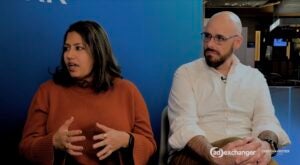 Here’s today’s AdExchanger.com news round-up… Want it by email? Sign up here.
Here’s today’s AdExchanger.com news round-up… Want it by email? Sign up here.
Podcast Debutante
Podcast networks pitched their wares to a room full of brands and buyers on Thursday at the IAB’s third annual Podcast Upfront in New York City. Audio networks including NPR, Midroll Media, Panoply, WNYC, HowStuffWorks and iHeartMedia presented their new fall series and content partnerships alongside giants like ESPN and Time Inc. Big brands have already started to spend on podcasting, which is attractive for its young, technologically savvy audience and well-lit environment. And better analytics from Apple coming this fall [AdExchanger coverage] will let advertisers track listener behavior back to actual purchases, giving them more confidence in their buys. With podcasting also getting more automated and targeted, agencies are gearing up to spend big. Look no further than WPP’s $5 million investment in podcast network Gimlet. More at Recode.
Making A First Impression
As AdExchanger covered this week, first-party bidding options have quietly permeated exchanges, but they come with very different successful buying strategies. Now OpenX has rolled out a tool for buyers who want to make sure they are bidding exclusively in traditional second-party markets or first-party auctions. OpenX refers to the “shadow” effect first-price auctions have had. Buyers may be happy bidding on first or second price, but they need to know for sure which model dictates the winning price, Goodway Group COO Jay Friedman tells Joe Mandese at MediaPost, adding that “other SSPs [supply-side platforms] should embrace similar transparent approaches in short order.” More.
Travel Complications
Trivago dropped its revenue growth forecast for this year, from 50% higher than 2016 to 40% higher. The company changed its bidding strategy to favor referral sources that scored higher on customer surveys, which meant those sources win the same amount of traffic with lower spend. The long-term expectation is that favoring user experience will pay off because traffic coming to the site will convert more often – a more “qualified referral.” But the short-term revenue drop means the travel search engine “has had less cash to use for bidding on keywords in Google search, which, in turn, reduces the traffic it gets from Google – compounding an overall revenue decline,” writes Sean O’Neil at Skift. More.
Skinny As A Beanpole
Spotify and Hulu have teamed up to offer students a $4.99-per-month subscription bundle ($13 off the market rate) that includes music streaming and Hulu’s ad-supported service. It’s a steep discount, but giving away the early revenue in favor of consumer stickiness is imperative for businesses at risk of being squeezed out by Netflix, Amazon, Apple, Alphabet or AT&T (packaging telecommunications, DirecTV and Time Warner assets like HBO). The future is skinny bundles, but a handful per person. More at Bloomberg.
But Wait, There’s More!
- Adform Partners With Research Now On Targeting, Performance – release
- AdRoll Launches New ABM Ad Platform – release
- Instagram Tests Feature To Share Stores To Facebook – TechCrunch
- Placed: Accurate Location Is In Limited Supply – blog
- Drawbridge And LiveRamp Sign Cross-Device Partnership – release
- A Guide To Programmatic In China – Digiday
- MIT To House IBM Watson AI Research Lab With $240M Investment – MIT
You’re Hired!











